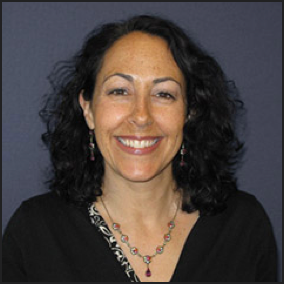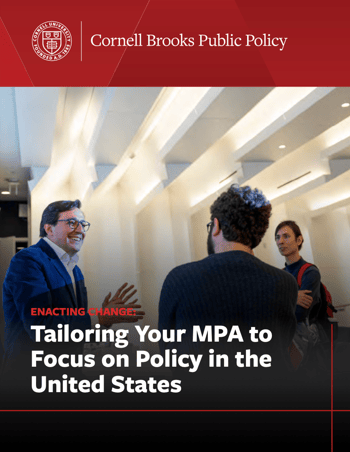Transforming Policy in the United States with My MPA

Julie Stone is Jewish American and was raised in sunny Los Angeles. Her musical husband is Panamanian, and they have two children. She’s an alum of Cornell University's MPA program, and she now works at Mathematica Policy Research where she works to advance delivery systems and financing innovation in Medicaid and Medicare.
We had the opportunity to ask her a few questions about her experience in Cornell's MPA program and about tailoring her career to make a difference in domestic policy.
What did you study prior to enrolling in Cornell’s MPA program?
I did my undergraduate degree in Film and Comparative Literature at the University of California, Berkeley, where I had the pleasure of spending four years watching movies and reading books.

What first attracted you to Cornell’s MPA?
While in college and during the four years I spent prior to attending Cornell, I did extensive volunteer work for the San Francisco Democratic Party and served on committees and boards for a variety of Jewish organizations committed to advancing social justice. During those years, I began to realize my passion for public affairs. I became determined to give my life meaning and to strive to improve the world around me. I quickly realized that my undergraduate degree in film and comparative literature hadn’t prepared me for the world of public policy. I needed a well-rounded graduate degree to provide me with the substantive know-how to launch me into a career in the public sector.
I set my mind to applying and discovered CIPA through an internet search. I called to learn more about the program and application process. The then CIPA director, Professor Arch Dotson, happened to be in the office when I called. He picked up the phone and we spoke for over an hour about the interdisciplinary and flexible nature of Cornell as well as its academic rigor. I shared information about my background, my volunteer work and passion for public policy. He warned me that if I were to come to CIPA, I would need to be trained in statistics, economics, public finance and law as I was sorely missing that in my academic background. I was so excited to broaden my education and was so surprised by the friendly and open nature of Professor Dotson that I applied immediately. CIPA has rolling admissions, and I was accepted a few weeks later with a welcome call from a CIPA student. I quickly packed my bags, said my goodbyes to my Bay Area life and moved myself far away from the world I was used to. When I walked into the CIPA office and met the friendly and welcoming staff, I knew I was in the right place. I had launched myself into an extraordinary academic and personal adventure and I was so excited.
What drew you to work in domestic policy?
I suppose I have always had a great urge to address the challenges and troubles I see in the world right around me – homelessness, disparities in access to health care, unaddressed mental health issues, among others. I am so often frustrated by the realization that this highly-developed nation has the resources and capacity to address all these challenges but has failed to do so. What is needed is the resolve, political commitment, and know-how to get it done. I guess I have always wanted to be part of this solution, to make a difference at home in support of the people around me. CIPA provided me the training, knowledge and credibility to position myself for a strong start in this effort.
What concentration did you choose at CIPA? And why?
While at CIPA, I wavered between international development and domestic policy. My professor at the time, Dr. David Lewis, helped me understand what a big impact even small efforts could make in developing countries. I was drawn to that. At the same time, the enormous passion held by another professor, Dr. Mildred Warner, for social policy called my attention.
In the end, my decision to focus on domestic policy stemmed from personal reasons: a drive to improve the world around me – the one I see and read about daily.
After completing the MPA at Cornell, where did you go on to work?
During my first and second years at CIPA, I did an internship at the Congressional Research Service (CRS), a nonpartisan legislative support agency of the U.S. Congress. I then went to work at CRS full time following graduation. For over a decade, I served as one of Congress’s in-house health policy experts supporting every stage of the legislative process, from developing change concepts to writing specifications for legislation. I also trained Members of Congress and staff in Medicaid, Medicare and private insurance policy. I helped them understand the potential consequences of statutory changes on vulnerable and underrepresented populations and on state and federal budgets.
In 2011, I moved with my family to San Francisco to work for the California Medicaid Research Institute, at the University of California, San Francisco. There, we sought to create linkages between Medicaid researchers and California’s Medicaid department to promote evidence-based decision-making. I then supported the transition of up to 400,000 low-income adults in Medicaid while serving as the policy director for a state association that represents California’s safety net hospitals and clinics. At Mathematical Policy Research, I have been so lucky as to be able to help advance behavioral health integration, support health care providers in addressing social determinants of health, and assisting with the implementation of innovative models intended to improve quality, patient outcomes, and curb spending.
Explain how Cornell’s MPA prepared you for mission-driven work in domestic policy.
Cornell provided me with a solid grounding in economics, statistics, public administration and the law. This foundational knowledge taught me to distinguish between spin and unbiased information. It also helped me distinguish myself amidst thousands of Congressional staff.
Further, my studies gave me the tools to support Members and their staff find objective evidence amidst the enormous body of bias and persuasive information for which they are bombarded on a daily basis. My time at CIPA also sparked my commitment to connecting evidence to policy-makers, a commitment that has deeply motivated me throughout my career in public policy.
Finally, what’s your favorite thing about the MPA program and Ithaca’s region?
CIPA expanded my world view. It provided me a forum to make friends from around the globe and gave us a reason to find common interests and shared views. These connections and bonds are likely to endure a lifetime. In addition, I will always be enormously grateful for the rigor of CIPA’s education. Although I complained at the time about being overwhelmed by work, my CIPA education strongly launched me into a career in public policy, setting me up to shine over and over again throughout my career.
Finally, I will never forget my moments of awe and joy as I waited for the morning Cornell bus and watched the icicles glistening in the light or listened to the whispering birds singing in the mornings. For a girl born and raised in Los Angeles, where environmental noise comes from vehicles and loud voices, life in Ithaca was truly enchanting.
Connect with us!
Ready to take on some of the world’s most complex policy challenges? You’re in the right place. We are looking for students of exceptional quality who have the analytical, leadership and communication skills necessary to succeed in a career serving the public in government, nonprofit or for-profit sectors. Let’s get started.



